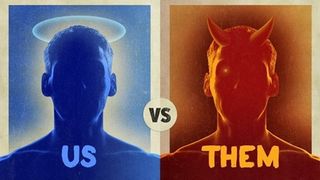Bias
What is the Trump Effect?
Let's focus on human similarities, not differences.
Posted November 9, 2016
Understand the psychological and social biases that make people vote for Trump or hate Trump voters, then think rationally and act compassionately. Find out why the Trump Effect explains the workings of society and culture in general, not just American Politics.

In this post, I do not take a partisan view for any specific political agenda. I simply note that on the morning of November 8 2016, some people feel empowered after the election results, and that many others feel rejected, embittered, and scared. I also note that election results - and this dramatic turn of events in particular - have the unfortunate, but predictable effect of reinforcing hatred between social groups.
.
Why anthropology and psychology matter to today’s problems.
My job as a cognitive anthropologist is to study the environmental, social, and psychological forces that make people think, act and feel in similar ways within their own cultural groups, and differ from group to group. When we focus too narrowly on differences in views, tastes, and behaviours across cultural groups, we sometimes forget the Big Picture. It is precisely because we share the same evolved psychology that we tend to develop the same intuitive sense of right and wrong as those we learn to associate with our own “tribe” (in-group in anthropological lingo), and subsequently come to distrust (often blindly hate) all the other people we relegate to our out-group.
Most modern humans don’t live in tribes anymore. Some people stay in their hometowns and are happy to dress and act like those around them. Some of us went to college, travelled abroad, tried new foods, settled in big cities, acquired new tastes and ways of life, and argue with our parents about religion and politics. In such cases, it is sometimes a little more difficult to remember that we simply integrated new tribes, and did not work as hard as we think to chose our new lifeways.
Politics and Group Biases
Let’s look at how this works in politics. Those who did not vote for Trump are appalled at the bigotry they associate with Trump voters. This morning on social media, many were expressing strong views and feelings against the “uneducated” “white-trash” people who elected him. But think again:
The sentences “I hate all Muslims / Women / Immigrants” and “I hate all White-Trash Rednecks” share more than a similar logical structure: they express the same cognitive bias toward in-group preference and out-group disgust. In logical terms, both are propositions that translate into “I hate all Xs”. X, for Trump voters and Trump haters alike, is the class of everyone who does not think exactly like them; that is, all those who do not share their views and tastes. Surely, as a species, we can do better. But it takes a lot more hard work than you think to avoid these common traps!
Let’s examine more of the mental shortcuts that compel us to think uncritically, and act unkindly toward others.
Politics and the Person Bias
Many others among the election’s discontents are quick to place all the blame on Donald Trump for his personal flaws on the one hand, and his evil manipulating qualities on the other. This is another cognitive bias called “the Fundamental Attribution Error (FAE)” that runs very deep in human psychology. Sometimes called the “Person Bias”, the FAE is a tendency to focus on the attributes and personality traits of a single person when making sense of a problem or an event. This tends to come with the related tendency to ignore all the contextual, Big-Picture clues. The human mind is just not very good at seeing the Big Picture. But paradoxically it is also deeply conditioned by hard-to-see, Big-Picture factors like historical, cultural, and economic forces.
It should be clear at this point that our folk psychology is not well-equipped to make sense of big political events and problems. Some of us may want to hold on to a “conspiracy” view of political problems. But if our best folk theory of politics is that people are easily manipulatable, then we need a better psychological theory to explain how that happens.
Begging the Question.
Did you ever ask yourself: Why do we have Red and Blue states? Why do we have tiny islands of urban Blue in seas of rural Red? Why do people grow up to love their city’s football or hockey teams, and why do they like to compete against other cities - and the people of those cities by extension? Why do Canadians like hockey, and why do Brazilians like soccer?
Ask yourself again: why do you like what you like? How did you develop your tastes for fashion and music? How did you acquire moral and political views?
Moral Dumbfoundedness
When the psychologist Jonathan Haidt (pronouced 'Height') presented different shocking scenarios involving incest and deviant sexuality (in which no one ever gets hurt or traumatized) to people of different cultures and education levels, he was given vastly different answers. But the results were always consistent. Some groups felt the scenario was morally right, and others that it was wrong. The responses were always consistent with culturally-held beliefs. When participants were asked to provide logical explanations for their moral positions, they couldn’t do it. Very quickly, the story could be stretched to a simple “it’s... just…. wrong”. Haidt called this “Moral dumbfoundedness”.
There are three points to take home from Haidt’s study of moral psychology:
1) we almost never think rationally about our beliefs and how we acquire them;
2) it takes a lot of mental effort to think rationally and see the Big Picture, and we are not very good at it;
3) we outsource most of our beliefs, tastes, and behaviours to people we associate with our in-group, and we do it intuitively, unconsciously, and automatically, by following a simple recipe.
The Trump Effect Explains Society and Culture in General
Once we understand this, we are in better position to learn a few more ingredients in the psycho-social recipe that governs our behaviour. Conspiracy theorists may be onto something when they insist that there are mechanisms of power behind this recipe. But they are wrong when they place all the blame in the hands of a few powerful people.
It might be tempting, then, to call this recipe the Trump Effect. As a cognitive anthropologist, I try to avoid Fundamental Attribution Errors and focus on group dynamics instead of personal attributes of the powerful. I prefer to call this recipe Epistemic Authority.
Epistemology is the branch of philosophy and cognitive science concerned with knowledge and how it is constructed and learned.
By Epistemic Authority, I simply refer to specific cues that posses the power to guide our thoughts, feelings, and behaviours automatically and unconsciously. As we have seen, our minds evolved with a series of biases (or mental shortcuts) that make us unusually sensitive to certain cues that activate our group psychology, and blind to other contextual cues.
The list of these "powerful' cues is short and simple. In seeking guides for our thoughts and actions, our minds run off specific cravings for:
1) other people from our group (in-group bias)
2) specific in-group members with prestige and status (prestige bias)
3) the comfort of numbers (social proof; frequency bias)
Prestige and status bias:
An important point to take from this short list is that, in implicitly outsourcing most of the information that will become relevant to us to an in-group, we are drawing on other cognitive biases toward knowing whom to learn from. In doing so, we seek guides and models from people who occupy a position of prestige in our in-groups.
This begins in infancy with our primary caregivers, elders, and the first authority figures we encounter in our lives. Later, we look to teachers, but also bullies, cool kids, scientists, and celebrities and any high-status members of our groups to find information and guides that seem intuitively reliable to us.
It is important to note that while the prestige bias may share a common evolutionary origin with the dominance system found among other great Apes, human prestige is “freely” conferred through collective consensus (however implicit), and rarely by sheer brute force. As the evolutionary anthropologist Joe Henrich likes to point out, we do not look to Steven Hawking for our understanding of physics because he is strong and tough enough to beat us into submission.
Age and Expertise
Because of the importance of Elders in sharing the precious information that needs to be passed down and improved upon from generation to generation, our evolved psychology maintains a bias for age. We like our politicians to be graybeards. We look to Elders for wisdom. But not always. Experiments have shown that learners will trade age against expertise when they figure out they can learn better from virtuosos. The “cool kids” we looked up to in high-school were simply doing what high-status people (in our relevant in-group) were doing, but they were doing it a little better. They dressed a little better; they anticipated the next fashion or fad move that would soon become adopted, then slowly abandoned as it would lose its prestige and new next-levels trends would arise.
Reputation and gossip
We all love to gossip, and obsessively keep track of each other’s reputations. When someone we know (in person or as a public figure) rises or falls in the game of what is culturally appropriate and desirable and acquires higher or lower status in our in-group, we adopt or discard them as prestigious guides for our thoughts and actions.
Strength in numbers.
We all love to be seen at a new trendy restaurant, particularly if we feel it was hard to get a booking. But we also ask about the most popular dish on the menu. In a new city, we will prefer to walk into a full restaurant over an empty one. If a restaurant, idea, moral position, or invention seems too new (in the sense that nobody we care about is going there or talking about it), we will feel an instant discomfort for it and will not be interested or will dismiss it as noise. In social psychology, this is called the social proof effect. In cognitive anthropology, we call this the “frequency bias”, or “conformist bias”. In order for a new trend to become epidemiologically successful, it needs to be widespread enough already, and to be associated with prestigious people. Otherwise, it just won’t hold!
Conclusion: Pause and register your Trumpings.
Cognitive Behavioural Therapy (CBT) and Mindfulness techniques have proved very helpful in the treatment of addictions and dysfunctional behaviours. A lot can be achieved by examining ourselves consciously, noticing and registering our cravings and emotions as they arise, and pausing to consider whether to act on them.
CBTing yourself for group psychology dysfunctions can begin by noticing your mental shortcuts, registering your cravings for in-group comfort, your tendency to be guided by prestige and numbers, and your automatic rejection of others based on the groups you associate them with.
This will entail distrusting your own intuitions and instant good feelings. You should know, for example, that recent experiments have shown how the much-celebrated 'love and social hormone' oxytocin was associated with increased solidarity for in-group members, and increased biases toward the out-group!
Then keep examining your tastes and beliefs, and ask yourself if you - and we as a species - can do better.
Further readings:
To find out more about the role of culture, group psychology, prestige biases, and information sharing in human evolution, read Joe Henrich’s The Secret of Our Success
For an excellent review of the cognitive biases that make it very difficult for humans to be rational and see the Big Picture, read Daniel Kahneman’s Thinking Fast and Slow.
If you need a bit of hope and want to re-discover the positive side of the Big Picture, read Sarah Hrdy's Mothers and Others: The Evolution of Mutual Understanding, for a moving account of how caring for each other, not fighting with each other is what makes our species so unique.
@ Follow Samuel Veissière on Facebook




